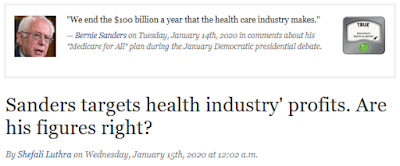Sanders said his plan would "end" $100 billion in health care industry profits, and PolitiFact plants a "True" Truth-O-Meter graphic just to the right of that claim.
But there's no fact check here of whether Sanders' plan would end $100 billion in profits. Instead the fact check looks at whether the health care industry makes $100 billion in profits (bold emphasis added):
The Sanders campaign shared its math, and it’s comprehensive.It looks to us like PolitiFact meticulously double-checked equations that did not adequately address the issue of health care profits.
The $100 billion total comes from adding the 2018 net revenues -- as disclosed by the companies -- for 10 pharmaceutical companies and 10 companies that work in health insurance.
We redid the numbers. Sanders is correct: The total net revenues, or profits, these companies posted in 2018 comes to just more than $100 billion - $100.96 billion, in fact. We also spoke to three independent health economists, who all told us that the math checks out.
There are a couple of wrinkles to consider. Some of the companies included -- Johnson & Johnson, for instance -- do more than just health care. Those other services likely affect their bottom lines.
But more importantly, $100 billion is likely an underestimate, experts told us.
On the one hand "We redid the numbers. Sanders is correct." But on the other hand "$100 billion is likely an underestimate."
The fact checkers are telling us Sanders was accurate but probably wrong.
But we've only covered a premise of Sanders' claim. The meat of the claim stems from Sanders saying he will "end" those profits.
Did Sanders mean he would cut $100 billion in profit or simply reduce profits by some unspecified amount? We don't see how a serious fact-check effort can proceed without somehow addressing that question.
PolitiFact proceeds to try to prove us wrong (bold emphasis added):
Sanders suggested that Medicare for All would "end" the $100 billion per year profits reaped by the health care industry.Though PolitiFact showed no inclination to pin down Sanders' meaning, the expert PolitiFact cited (professor of health economics Ellen Meara) translates Sanders' point as "There's room to pay less."
The proposal would certainly give Washington the power to do that.
"If you had Medicare for All, you have a single payer that would be paying lower prices," Meara said.
That means lower prices and profits for pharmaceuticals, lower margins for insurers and lower prices for hospitals and health systems.
That could bring tradeoffs: for instance, fewer people choosing to practice medicine. But, Meara noted, the number supports Sanders’ larger thesis. "There’s room to pay less."
Do the fact checkers care how much less? Is PolitiFact actually fact-checking whether Sanders' plan would lower profit margins and it doesn't matter by how much?
Side note: PolitiFact's expert donates politically to Democrats. PolitiFact doesn't think you need to know that. PolitiFact is also supposedly a champion of transparency.
Where's the Fact Check?
PolitiFact does not know how much, if at all, the Sanders plan would cut profit margins.PolitiFact does not specify how it interprets Sanders' claim of bringing an "end" to $100 billion in profits (the cited expert expects a lower profit margin but offers no estimate).
The bulk of the fact check is a journalistic hole. It fails to offer any kind of serious estimate of how much the Sanders' plan might trim profits. If the plan trims profits down to $75 billion, presumably PolitiFact would count that as ending $100 billion in profits.
Using that slippery understanding, quite a few outcomes could count as ending $100 billion in profits. But how many prospective voters think Sanders is promising to save consumers that $100 billion?
"Fact-checking."
That's no "centrist bias." That's doing Sanders a huge favor. It's liberal bias, the prevalent species at PolitiFact.


"End" might mean reducing it to $99 billion, since it's not $100 billion any more. What a stupid statement to make, regardless of any fact-checking about it
ReplyDeleteRight.
DeleteThe main reason we didn't use a number that high as our example is that one can very legitimately round up to $100 billion from $99 billion. At $75 billion rounding up to $100 billion is a bit harder to justify.